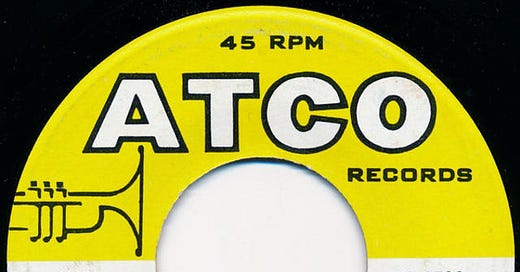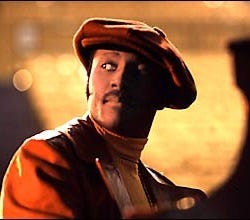“This Christmas” by DONNY HATHAWAY
For a Christmas Standard to endure, it has to be vulnerable.
A very special Christmas for me
“Nostalgia is memory with the pain removed,” wrote beloved San Francisco Chronicle columnist Herb Caen. Christmas pop songs are often so bound up in holiday tropes that they don’t sound contemporary so much as nostalgic even for 10 minutes ago. This candy-striped sugar rush of holiday cheer, however, misses that many of the classic Christmas songs are actually bittersweet: “Have Yourself a Merry Little Christmas,” most famously, with its “Next year all our troubles will be out of sight,” but also “I’ll be home for Christmas, if only in my dreams.” Even in “White Christmas,” there’s an undercurrent of melancholy that makes the memory of “just like the ones I used to know” ache with longing. From the worries of wartime America to the fragile beauty of a savior appearing in a stable as a baby wrapped in swaddling clothes, relief from our struggles is what makes the joy of the season incandescent. That’s the standard for a Christmas Standard.
“White Christmas” was written by Irving Berlin, a pro’s pro. Nadine McKinnor wrote “This Christmas” while working as a holiday temp in a Chicago post office. There, she saw holiday cards and magazines go by as she hummed along with Christmas songs on the radio. This “overdose of Christmas Joy” led her to write some lyrics in a spiral notebook as an answer to one of her favorites, Nat “King” Cole’s “The Christmas Song.” Later, her boyfriend was doing some interior design work for Donny Hathaway, whose song “The Ghetto,” was currently on the radio, and arranged for her to sing him a few of her songs. She says that after she sang “This Christmas,” Hathaway said, ‘Wait a minute, sing that again.’” She ripped that page out of the notebook and handed it to him. Hathaway took it and ran with it.
Hathaway dropped out of Howard, where he studied music on a fine arts scholarship, to move to Chicago for a job working at Curtis Mayfield’s Curtom label as a writer, producer, arranger, and session musician. Hathaway was born in Chicago but raised in St. Louis by his grandmother, where he began singing gospel as a child under the name Donny Pitts1. It was while working at Curtom, where he participated in sessions for Mayfield, the Impressions, the Staple Singers, and Aretha Franklin, that he was spotted by King Curtis and signed to Atlantic Records sub-label Atco. His debut, Everything is Everything, which he co-produced and wrote five of the nine songs, was released on July 1st 1970. Esteemed producer Joel Dorn, who produced the 1972 million-selling Roberta Flack and Donny Hathaway, said Hathaway’s debut was his best, that it had "a certain innocence to it. Afterwards, he was a genius, but right then, he was just another guy tryin'."
“This Christmas,” as performed, arranged and co-produced by Hathaway, is a song about a guy tryin’. The single was released in 1970 a few months after his debut album, and he gives it a midtempo groove not far off from “The Ghetto.” Heraldic trumpets and sleigh bells played by co-producer Ric Powell, Hathaway’s Howard classmate, give it its holiday feel; low brass and lush strings wrap it in romance like garland around a tree. As romantic songs go, however, its goals are modest.
Hang all the mistletoe
I’m going to get to know you better
This Christmas
And as we trim the tree
How much fun it's gonna be together
This Christmas
The song’s small scale, grounding it in the everyday, is part of what makes it special. It isn’t about epic love or a holiday that’s one for the ages. It’s just about this Christmas. The idea is driven home by Hathaway’s phrasings through the choruses, which give equal emphasis to each syllable to the lyric that forms the song’s title. The romance couldn’t be more gentle — it’s having fun and getting to know someone better. “Better,” and striving for it, is what underpins the whole song. Inherent in this Christmas is the subtle indication that past ones haven’t been great. You feel it in Hathaway’s bravura vocal performance on the lyric “This Christmas will be a very special Christmas for me.”
Striving toward a better holiday could be indicative of many things – the struggle to fully enjoy a Christmas bordered by the shadow of those who are no longer with us, for example. It’s clear, however, that Hathaway wanted to create a Christmas Standard that was by Black people for Black people. “He knew what he wanted to do musically and the impact he wanted to make with this song," Powell said. The song has been further made a standard with versions by R&B luminaries like Aretha, Patti Labelle, and The Temptations. But it’s also more recently been covered by artists like Christina Aguilera, English singer Jess Glynne, and the Lady formerly known as Antebellum. “As with everything that we create in this culture, it starts with us, and then when it’s great, it resonates outside of our community — it becomes a part of the fabric of America,” Lalah Hathaway, herself a Grammy winner, said. “I think my father would be tickled.”
“We have learned to be a little sad and a little lonesome without being sickly about it,” poet Carl Sandberg said of WWII-era America, “This feeling is caught in the song of a thousand jukeboxes and the tune whistled in streets and homes. ‘I’m Dreaming of a White Christmas.’ When we sing that, we don’t hate anybody. Way down under… Irving Berlin catches us where we love peace.” Similarly, the modern Christmas Standard “This Christmas,” written during a different war, ends with a plea to “shake a hand, shake a hand / wish your brother Merry Christmas / all over the land.” Peace on earth and goodwill to men, indeed.
“Nostalgia” is actually a Greek compound word, combing the words for “homecoming” with “ache.” Irving Berlin denied any deeper meanings to his song lyrics, but one wonders if the subtle sorrow in “White Christmas” wasn’t just a Hollywood songwriter being homesick for New York: Berlin’s three week-old son died of crib death on Christmas morning in 1928. Likewise, real life has added poignancy to “This Christmas.” Donny Hathaway was diagnosed with paranoid schizophrenia and given a pill regimen of dozens a day, meds he sometimes went off. After paranoid delusions aborted a studio session for a new solo album in 1979, Hathaway fell from a hotel window in an apparent suicide. The joy in “This Christmas,” so evident in the brilliant humanity of his voice, is another fragile beauty lit so brightly each Christmas. It’s a reminder to try to make the holiday season, the one right now, special — a triumph over our struggles. Because sometimes the struggles win.
11 Song Playlist
“This Christmas” and Donny Hathaway
…and a Happy New Year
Next week will be the last post for the year, as I need to focus on striving to make this Christmas a better one myself. Thanks so much for reading and sharing.
His songwriting credit for “This Christmas” is as Donny Pitts






So great to read about Donny Hathaway here. I love him. He was my #4 artist on my Spotify Wrapped list this year.